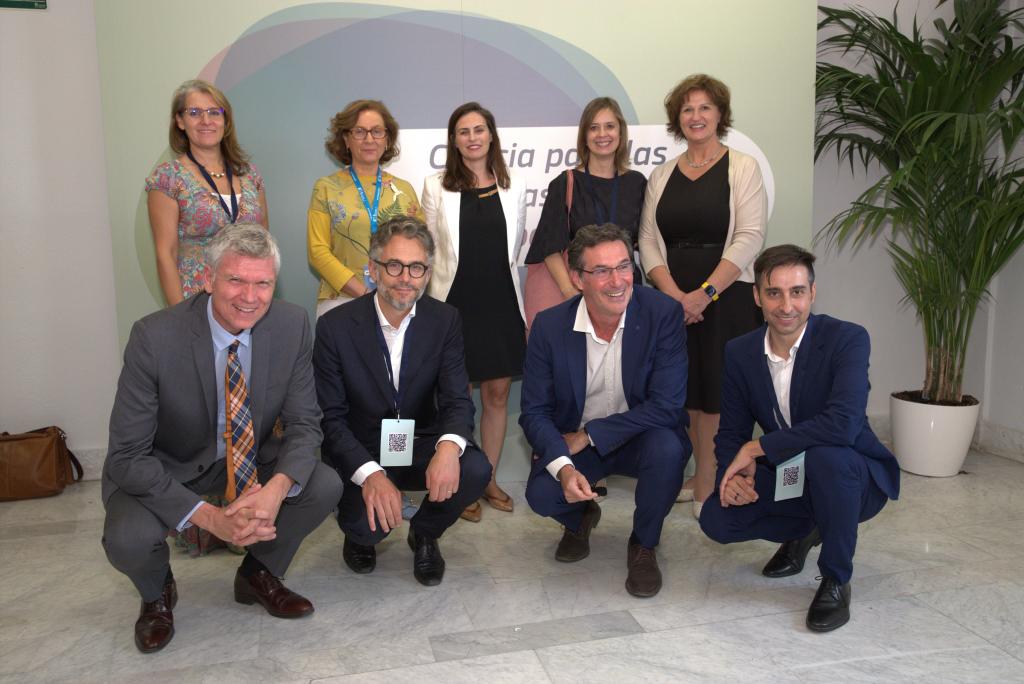- More than 225 people attended the meeting "Ciencia para las políticas públicas en España" that was opened by Spanish Acting Minister of Science and Innovation Diana Morant, and had the participation of several public authorities and high-level representatives of scientific organisations.
- The JRC external report "El ecosistema de asesoramiento científico y técnico a las políticas públicas en España" was presented and triggered debate during the whole day. The report maps the main actors in the Spanish science-for-policy ecosystem and suggests policy recommendations.
- Spain is characterised by having a rich and diverse science-for-policy ecosystem with recent positive innovations in terms of new intermediary organisations at both the national government and parliament, and new legislations and policy strategies in support of evidence-informed policymaking.
Madrid, 21st September 2023
The European Commission's Joint Research Centre (JRC) and the Spanish Ministry of Science and Innovation, in collaboration with the Spanish Foundation for Science and Technology (FECYT), organised a conference that brought together all the actors of the science-for-policy ecosystem in Spain.
This event was organised within the framework of the Spanish Presidency of the Council of the European Union and the JRC workshop series "Strengthening and connecting science-for-policy ecosystems across Europe".
The conference provided the opportunity to create, for the first time, a forum for dialogue between the different stakeholders of the Spanish R&D&I system, political representatives and public managers from different governmental departments at all levels of the public administration (European, national and regional). This opportunity helped nurturing an interactive community of experts and practitioners in science for policy in Spain that would be able to further consolidate ongoing reforms and strengthen evidence-informed policymaking in the country.
The meeting took place at the Círculo de Bellas Artes in Madrid and was opened by the Acting Minister of Science and Innovation, Diana Morant; the European Commission's Joint Research Centre (JRC) Director of Innovation in Science and Public Policy of the European Commission's Joint Research Centre Jolita Butkeviciene; and the Director General of FECYT, Imma Aguilar. The conference was brought to a close by the Secretary General for Innovation of the Ministry of Science and Innovation, Teresa Riesgo.
In her contributions during the day, Jolita Butkeviciene highlighted the role of the JRC in supporting national reforms in European Union Member States to build capacity for evidence-informed policymaking in governance and public administration. Butkeviciene praised the recent reforms undertaken in Spain to underpin scientific evidence to the policy process and offered the institutional support of the JRC to accompany future reforms in this field. The JRC Director also underlined the need to promote platforms for mutual learning exchange across EU Member States and that Spain was showing leadership across Europe to put science for policy in the centre of the political agenda.
The use of scientific knowledge to develop public policies is today more important than ever. For this reason, throughout the conference all panellists discussed how to contribute to the cultural change that facilitates the exchange of information between the scientific community and policymakers, how to communicate the work of scientific advice to society and how to move towards the consolidation of diversified and efficient scientific advice in both governments and parliaments in Spain, among other aspects.
In addition, the JRC presented its external report "El ecosistema de asesoramiento científico y técnico a las políticas públicas en España". With the participation of its authors Dr Carolina Cañibano and Dr José Real-Dato, the attendees were able to learn about the current state of the Spanish science-for-policy ecosystem, the recent reforms in structures, laws and government strategic documents, and identifies the current challenges for its improvement.
Likewise, the collaboration that the JRC has with all Member States and, particularly, with Spain, was discussed in depth; and different initiatives that have managed to connect science, public policies and society in Spain and other successful European experiences were presented. The JRC Director of Fair and Sustainable Economy Mikel Landabaso together with JRC scientists Ana Agundez-García and Romina Cachia participated at a dialogue on the work of the JRC as an intermediary organisation between science and policymaking at the level of the European institutions, but also with collaborations with Member States. JRC scientists Ana Agundez-García and Romina Cachia provided with their experience particular examples of scientific knowledge informed policymaking in the fields of fiscal policies and education and digital technologies.
But science for policy does not only happen at the European and national level, the JRC programme "Science meets Regions" organised a parallel session during the conference. During this session, different regional initiatives in Spain covering Navarra, Extremadura, Valencia and Granada were showcased and attendees cocreated a series of recommendations for the future of the programme.

JRC representatives during the meeting. From left to right, first row: Ana Agundez-García (Deputy Head of Unit for Fiscal Policy Analysis), Covadonga Astorga-Llorens (Scientist and project manager for Sustainable, Smart and Safe Mobility), Romina Cachia (Project Leader Scientific / Technical - Digital Education and Skills), Leire Salazar (Technical Project Leader at Centre for Advanced Studies, Science and Art), Jolita Butkeviciene (Director of Innovation in Science and Policymaking); second row: Johan Stierna (Lead Scientist in Fair and Sustainable Economy), Stijn Verleyen (Coordinator of Inter-institutional relations and project leader "Science meets regions"), Mikel Landabaso (Director of Fair and Sustainable Economy), and Lorenzo Melchor (policy analyst at the Unit for Science for democracy and evidence-informed policymaking).
The event was live streamed and is available via: https://www.youtube.com/watch?v=jOff8wsCccI.
In conclusion, the JRC successfully delivered another workshop to analyse national science-for-policy ecosystems and the conference was very useful to bring together key actors in the ecosystem with a strong political support from across governmental departments.
| Originally Published | 28 Sep 2023 |
| Knowledge service | Metadata | Evidence-Informed Policy Making | Science for Policy Ecosystems |
